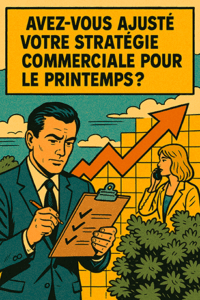
Adaptive Leadership in Hybrid Organizations
The adaptive leader, like a chameleon, adjusts in real time to effectively orchestrate a hybrid and connected team.
Par Nadia Bulcourt – 12 Août 2024
I’m delighted to be making this video because I know that my prospects, customers, and business partners love sport. And tonight, Djokovic is playing Rune. Tennis fans know that this is an interesting match. After all, they saw the Bercy final last year, and Rune won in 3 sets. So today it’s a quarter-final rematch.
Why am I making this little video? I talk about a multitude of business subjects, we have likes on LinkedIn. People tell me it’s interesting what I’m saying about marketing visibility, about the bridges between sales and marketing, and so on. But it’s still complicated for some people. These people can never remember and don’t know where to start.
The parallels between a top-level tennis player like Djokovic and the sales department of a company are striking. In both cases, preparation, strategy, and execution on D-Day are essential for success. Here’s how to transpose the principles of tennis to business development to perform on D-Day.
It’s simple: if you have two or three points to remember, remember that sales performance depends on many things. We’ve talked about this on LinkedIn.
Sales performance depends on the visibility of your organization. You can make a diagnosis of your current sales and marketing department, really take a snapshot to find out what it’s worth today compared to what you’ve invested over the past year, two, three or even five.
Where do you stand? Today, very few companies do this. So, think about your diagnosis. How far have you got with sales and marketing?
We need leads, we need appointments. Preparation is very important. Tennis champions invest in a team of physiotherapists and a trainer.
When the trainer isn’t good, they change him. The physio, when he’s no good, they change him. When the diet isn’t right, they change it. It’s part of their daily routine. It’s part of their daily routine to change teams and keep the best ones.
A tennis player doesn’t just step onto the court on match day. He practices for hours on end, perfecting his shots, studying his opponents, and refining his strategy. In the same way, the sales department must prepare itself meticulously.
This includes ongoing team training, a thorough understanding of the products and services on offer, and knowledge of the market and potential customers.
Tip: Set up regular training sessions for your sales force, analyze market data and adjust your strategies in line with identified trends and needs.
Come down to earth. You’re a B2B company. You’ve made a smart product, a beautiful piece of software. You’re not expected. End customers aren’t waiting for you. There are 10,000 technologies out there. Stop talking about leads and saying: “I want more leads, Jean-Charles, I want more appointments”.
How much is your customer acquisition cost? If you know that your customer acquisition cost is €5,000 and you convert one lead out of two, you can pay €2,500 for your lead because you’re going to sign it. You’re going to sign one in two. So, if your customer acquisition cost is €5,000, yes, you can pay €2,500 per lead.
Now, if you tell me you want to pay €250 per lead. You want 10 leads, so you pay €2,500 per 10 leads, but you don’t convert any of the 10. Maybe there’s a problem.
Question the value of your sales and marketing department!
Djokovic doesn’t start a match without a well-defined strategy. He knows his opponent’s strengths and weaknesses and adapts his game accordingly.
In the same way, your sales department needs to develop a clear and detailed strategy to achieve its objectives.
This includes identifying priority targets, defining the stages of the sales process and establishing KPIs (key performance indicators) to measure progress.
Tip: Develop a precise sales action plan with SMART (Specific, Measurable, Achievable, Realistic, Time-bound) objectives and re-evaluate it regularly to stay on track.
And on D-day, be ready! Be like the tennis champions who have been well prepared for many years. In general, their career lasts 10 to 15 years (even if people like Djokovic push the limits of history), like a box, like a company. So, there’s a history.
They prepare every day for big moments, for big events. It’s not just about winning a final. You must win every match up to the final! There are between five and seven rounds in a tournament, seven rounds for a Grand Slam. For the Masters, there were fewer rounds, between four and five.
The aim of the game isn’t just to reach the final! It’s about winning every round, saving your physique. And in the end, you must win the final and not be too tired either, be in good shape. That’s the goal of a tennis player.
A tennis match is dynamic and unpredictable. Players need to be able to adapt quickly to changing situations.
Similarly, in business development, the ability to react promptly to challenges and opportunities is essential. Whether responding to an aggressive competitor or capitalizing on a new market trend, agility is key.
Tip: Foster a culture of innovation and flexibility within your sales team, enabling everyone to adjust quickly to changes and seize opportunities as they arise.
When you’re a customer, you want sales performance. When tennis players lose in the first or second round, they may pocket a check for losing, but it doesn’t reimburse all the costs they incur during the year. That’s why only the top 100 can make a decent living from their job.
So, you, on the other hand, don’t earn any checks. When you arrive and you don’t sign a contract, you’re number two in the final, you win zero. You’ve lost everything.
So, think a little about your customer acquisition costs, your sales diagnosis, where you stand and try to perform well on the big day. It’s important.
Mental resilience is a fundamental aspect of a tennis player’s game. Djokovic, for example, is known for his ability to stay focused and bounce back after a losing set.
In a business context, resilience is just as important. Failure and rejection are part of the sales process. What counts is your team’s ability to stay motivated and persevere in the face of challenges.
Tip: Cultivate a positive and supportive work environment, where failures are seen as learning opportunities, not defeats.
Here are two hyper-prepared players. And today they’ll be watching each other. For a company, it’s not just about having certain skills, having soft skills or hard skills.
If Rune comes onto the court with an extremely different strategy to what was planned, do you think Djokovic will play his game the way he usually does, waiting for Rune to win 6-4 / 5-3? He’ll change his strategy immediately.
So, to draw a parallel with product pitches, stop thinking about just generating leads! Think about the performance you have, the performance of your current sales and marketing department.
Ask yourself the right questions!
Sales performance is exactly the same as a tennis player’s performance. On the big day, you may lose, but you’re going to give it your all to adapt your strategy to your opponent.
On match day, all the preparation and strategy culminate in a performance. For the sales department, D-Day can be a key presentation, a big meeting with a potential customer or the launch of a new sales campaign.
This is the moment when all skills and efforts must converge to achieve the set objectives.
Tip: Make sure your team has all the tools and resources they need to excel on the big day, whether it’s presentation materials, relevant data, or advanced technology.
It’s not push product, as I see all too often today. 99 out of 100 companies are organized in silos and push product, push product: “My product is good”. But this, but that… Nobody cares.
First meeting, first appointment. Listen to your prospects, listen to your customers. And before you have those first meetings, get ready!
How far have you got? Is it enough to send a sequence of e-mails, to have answered a few automated e-mails? How much trust have you built up with your prospects and customers?
These are the real questions. Here’s a good example tonight. Watch this match between Rune and Djokovic and you’ll see what performance all is about.

The adaptive leader, like a chameleon, adjusts in real time to effectively orchestrate a hybrid and connected team.

Looking for commercial results without the recruitment delay? Discover how a fractional Sales Director can hit the ground running and drive performance from day one.

Spring is a turning point in your business dynamics. Take stock of your commitments, realign your teams, and boost your results before summer.

Feeling the winter drag on your team? Reignite connection, clean your tools, and give your people purpose with 3 actionable ideas from Finelis.

Spring is a strategic time to boost your business. Discover how to align your sales efforts with seasonal cycles and turn the transition into a growth driver.

Attending a trade show is a powerful business opportunity. Discover how to maximize your impact with strong preparation, engaging techniques, and structured follow-ups.